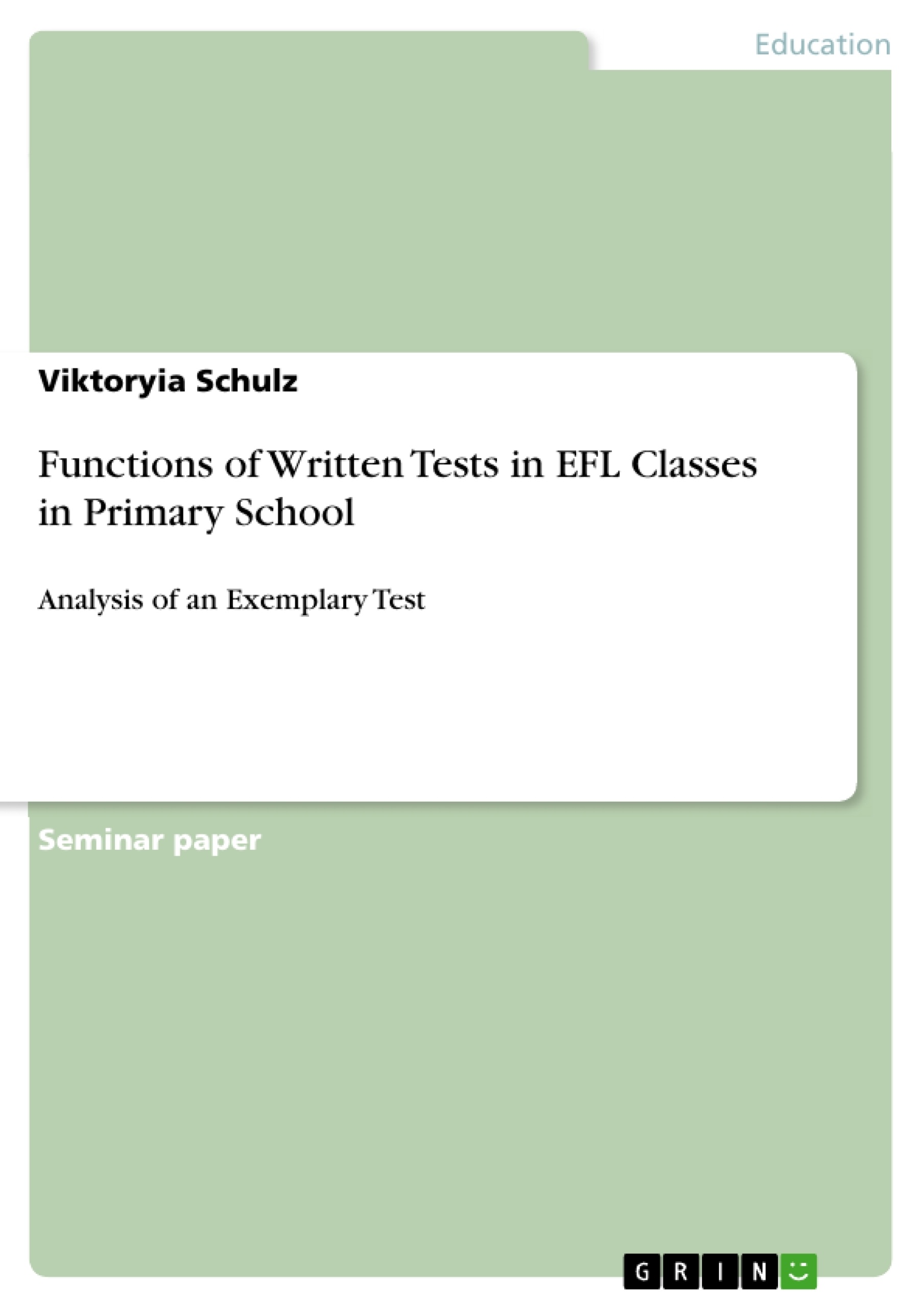The term paper focuses on written tests and their functions in EFL classes in primary school. Regarding the peculiarities of EFL classes in primary classroom, the main function of written tests will be outlined. Börner and Edelhoff specify the functions of written tests in primary school. They point out diagnostic, (forward) guidance, comparison and (value) judgement functions. In the course of the term paper the exemplary written test is investigated regarding its diagnostic function.
The subject English as a foreign language [EFL] belongs since 2005/2006 to the curriculum of primary school in whole Germany. The EU research study of 2007 on early language learning, education quality and pedagogical principles states that early foreign language acquisition is favoured over the late one, as the younger students are intrinsically motivated and have a positive attitude to EFL acquisition process.
EFL acquisition in primary school usually begins in the third grade and aims to provide the first experiences with learning a foreign language. Nevertheless, these first experiences are to be assessed and the students are to be provided with feedback. This procedure demands a large amount of effort and reflection time on the teacher’s side, considering the communicative character and some other peculiarities of EFL classes in primary school. Correspondingly, the topic challenges many teachers while teaching EFL in primary classroom. Therefore, the ways to facilitate this challenge are sought. A written test is an assessment form that manage the challenge and can be easily used in primary school.
Constructively, the exemplary test will be reviewed, if this specific function is realised. Therefore, the central question of the term paper is how far the exemplary test aids the realisation of the diagnostic function. The analysis and the following reflection of the exemplary test are grounded on the sources Brown and Abeywickrama ‘Language Assessment: Principles and Classroom Practices’ and of Küchler and Roters ‘Embracing Everyone: Inklusiver Fremdsprachenunterricht’.
Inhaltsverzeichnis (Table of Contents)
- 1. Introduction.
- 2. Testing in the EFL Primary Classroom
- 3. Differentiation of Written Tests in the EFL Primary Classroom
- 4. Quality Criteria of Written Tests
- 4.1 Validity
- 4.2 Student-Reliability
- 5. Reflection of Test Creation
- 6. Conclusion
- 7. Development of my Professional Vision
- 8. List of References
- 9. Appendix
- 9.1 The Exemplary Test
- 9.2 Differentiated Task
Zielsetzung und Themenschwerpunkte (Objectives and Key Themes)
This term paper aims to examine the functions of written tests in EFL classes in primary school, specifically focusing on their diagnostic role. The paper analyzes an exemplary written test, evaluating its effectiveness in assessing student learning and providing valuable insights for teachers.
- The role and definition of tests in EFL classes in primary school
- The diagnostic function of written tests and its application in EFL instruction
- Differentiation strategies for written tests to cater to diverse student needs
- Quality criteria for effective written tests, including validity and student reliability
- The practical implications of test creation and the evaluation of an exemplary test
Zusammenfassung der Kapitel (Chapter Summaries)
- Chapter 1: Testing in the EFL Primary Classroom: This chapter establishes a foundation for the paper by defining tests and assessment in the context of EFL instruction. It delves into the various functions of written tests in primary school, highlighting their role in monitoring student progress and informing teaching practices. The diagnostic function of written tests is further elaborated upon, providing a framework for the subsequent analysis of the exemplary test.
- Chapter 2: Differentiation of Written Tests in the EFL Primary Classroom: This chapter explores the importance of differentiating written tests to meet the diverse needs of primary school learners. It outlines various strategies for task differentiation based on the diagnostic function of the tests, aiming to ensure that all students have the opportunity to demonstrate their understanding and progress.
- Chapter 3: Quality Criteria of Written Tests: This chapter discusses the essential quality criteria of effective written tests, specifically focusing on validity and student-reliability. These criteria are crucial for ensuring that tests accurately measure student performance and provide reliable information for educators. The importance of these criteria for the analysis and reflection of the exemplary test is highlighted.
- Chapter 4: Reflection of Test Creation: This chapter delves into the practical aspects of test creation. It applies the theoretical concepts discussed in previous chapters to analyze the exemplary test, examining its effectiveness in fulfilling its intended diagnostic function. The analysis aims to identify both strengths and weaknesses of the test, providing valuable insights for future test design and development.
Schlüsselwörter (Keywords)
This term paper focuses on the key concepts of written tests in EFL classes in primary school, particularly the diagnostic function. It explores differentiation strategies, quality criteria, and the practical implications of test creation. The paper draws upon key resources, such as Brown and Abeywickrama (2010), to inform its analysis of the exemplary test.
Frequently Asked Questions
What is the diagnostic function of a written test in primary school?
The diagnostic function aims to identify the current learning status and individual needs of students to inform further teaching and provide specific feedback.
Why is early foreign language acquisition favored in primary school?
Younger students are often more intrinsically motivated and have a more positive attitude toward the language learning process compared to older learners.
What are the main quality criteria for effective EFL tests?
The two central criteria discussed are validity (measuring what is intended) and student-reliability (consistency and fairness of the results).
How can written tests be differentiated for diverse learners?
Differentiation involves adapting task difficulty or formats to ensure that all students can demonstrate their knowledge regardless of their individual starting points.
When does EFL instruction typically start in German primary schools?
English as a Foreign Language [EFL] instruction usually begins in the third grade of primary school.
- Citation du texte
- Viktoryia Schulz (Auteur), 2019, Functions of Written Tests in EFL Classes in Primary School, Munich, GRIN Verlag, https://www.grin.com/document/480662



